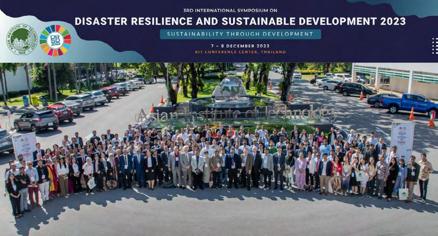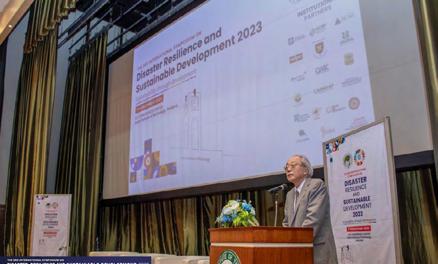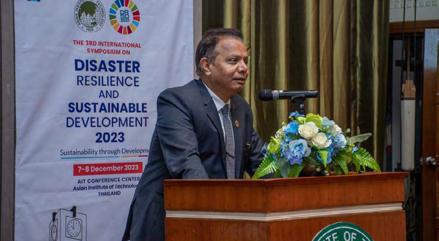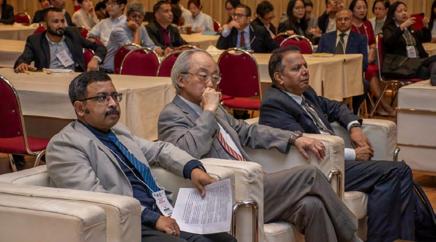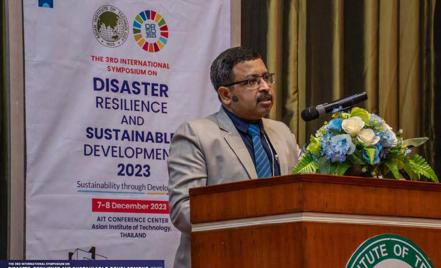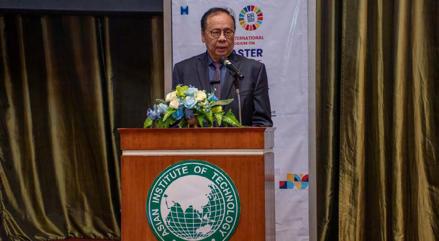






AIT Research Theme: Technology, Policy and Society
AIT Unit: Geoinformatics Center
Project Duration: 20 May 2022 to 19 May 2027
Project Sponsors/Clients: Japan Aerospace Exploration Agency (JAXA) and others, Japan
Expected Social Impact: Sustainable communities and poverty reduction.
Description:
The “Sentinel Asia and Capacity Building” project focuses on leveraging satellite and drone data processing to support emergency response activations and capacitybuilding initiatives. Sponsored by JAXA for the past 15 years, this project has established a robust framework for uploading value-added products and coordinating with national agencies to enhance disaster response strategies. It includes comprehensive training programs and workshops aimed at strengthening skills and knowledge across various sectors.
This ongoing initiative aligns with the AIT Research Theme of Technology, Policy, and Society, reflecting a


commitment to integrating technological advancements with policy development and societal needs. The main Sustainable Development Goal (SDG) targeted by this project is SDG 11, which promotes sustainable cities and communities. Additionally, it supports SDG 1, focusing on eradicating poverty in all its forms.
Looking ahead, the Sentinel Asia project is set to continue for the next five years, further developing its capabilities and extending its impact on regional resilience and capacity building.



AIT Research Theme: Smart communities
AIT Unit: SET / Mechatronics
Project Duration: 1 April 2022 to 31 March 2024
Project Sponsor/Client: Universiti Malaya
Expected Social Impact: Skilled personnel in Smart City
Description:
The “Smart City ASEAN Learning Network” project is dedicated to the professional development and upskilling of both existing and future smart city experts.
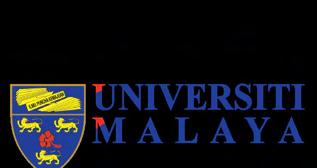

It seeks to offer sufficient educational opportunities to young students and the current workforce, crucial for facilitating a fair, efficient, and sustainable evolution into smart cities. The initiative directly supports Sustainable Development Goal (SDG) 11, which aims to make cities and human settlements inclusive, safe, resilient, and sustainable. Additionally, the project aligns with SDG 4, which emphasizes the importance of quality education
for all, and SDG 9, which promotes resilient infrastructure and fosters innovation and industrial development. This strategic focus not only enhances professional capabilities but also ensures that the transition towards smart cities occurs within a robust educational framework, preparing societies for future technological advancements and sustainable growth.

AIT Research Theme: Technology, Policy and Society
AIT Unit: SET/TrE
Project Duration: 1 November 2022 to 31 December 2023
Project Sponsor/Client: Asian Honda Motor Co., Ltd., Thailand
Expected Social Impact: The trainees can conduct the MC AI in their own countries.
Description:
The AIT research project, under the “Technology, Policy, and Society” theme, is led by the School of Engineering and Technology (SET), Transportation Engineering (TrE) unit. Running from 1 November 2022 to 31 December 2023, this initiative is sponsored by Asian Honda Motor Co., Ltd., Thailand. The project focuses on providing comprehensive Motorcycle Accident Investigation (MC AI) Training for Honda personnel across four countries. The training aims to equip participants with the skills and knowledge necessary to conduct in-depth investigations
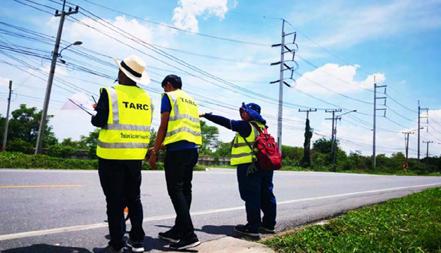
into motorcycle accidents in their respective regions. By enhancing the technical expertise of Honda’s personnel, the project seeks to improve road safety outcomes and contribute to reducing motorcycle-related accidents. The expected social impact is significant, as the trained individuals will be able to apply their newly acquired skills within their home countries, fostering a safer driving environment and potentially saving lives.

AIT Research Theme: Infrastructure
AIT Unit: SET/TrE
Project Duration: 1 July 2022 to 30 April 2024
Project Sponsors/Clients: LEA Associates South Asia Pvt. Ltd. And Jv Dongsung Engineer Co., Ltd.
Expected Social Impact: The approach of Star Rating represents a systematic approach to road infrastructure design about where severe crashes are likely to occur. The Star Ratings by iRAP protocols enables the benchmarking and can be used as a basis of performance tracking after the road safety improvement program. The road assessment will be illustrated in a risk mapping and star ratings. In this project, the star rating model will be used as a simple and objective measure of the level of safety provided by road infrastructure. As the Ministry of Public Works and Transport (MPWT) of Lao PDR is implementing the “NR13 South Improvement
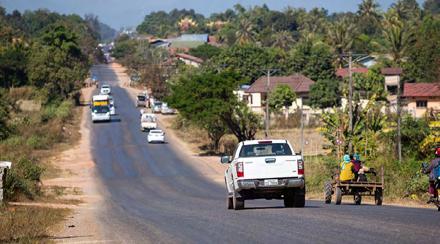
and maintenance contract” with financing from World Bank, AIIB and EIB. The Star Rating will be used as a performance indicator to demonstrate the risk reduction after the project is implemented. Therefore, the star ratings of the road infrastructure before and after the road improvement need to be conducted
Description:
The project is to conduct the road assessment following iRAP protocol for NR13 South in Lao PDR, starting from KM 71 in Tha Phrabath District, Bolikhamxay Province and ending at KM 346 in Thakhek District, Khammouan Province with a length of 275km . The Star Rating by iRAP was used as a performance indicator to demonstrate the risk reduction after the project is implemented. The purpose of the iRAP assessment is to identify areas of concern for the safety of the travelling public, and the recommendations based on the iRAP Star rating will be prepared for the mitigation of identified risks.
The project will conduct the field surveys for the base-line assessment including the survey of operating speed and pedestrian volume, and the data were used as inputs in the coding process to prepare the iRAP star rating report.
Research/Training:
1. Road assessment process will be conducted following iRAP protocol. Detailed workplan and schedule for each site survey will be presented in the report. Types of data to be collected and survey activities will be described.
2. Coding of Project Road Data:
The coding of project road data will be conducted based on the results from site surveys. The following information will be used in the iRAP coding process:
⏵ Existing designs, either conceptual design or detailed design, where completed
⏵ Videos of the section before construction started, as well as photographs, available through Mapillary, Google Street View images, and videos recorded from the site survey.
⏵ Traffic data, operating speed data, pedestrian volume, and accident data (if available).
⏵ All of the road attributes data will be compiled in every 100 m intervals as required for the iRAP star rating and safer roads investment plans. The coding will be done through ViDA-online Software provided by iRAP, and will be checked at two levels, by coding team leader and iRAP coding specialists to ensure the accuracy of coding process.
3. Baseline iRAP Star rating
The field surveys for the base-line assessment will be conducted, driving the project road in each direction. The additional data collection will include the survey of operating speed and pedestrian volume and will be used as inputs in the coding process. After the coding completion, the iRAP star rating report will be presented with the risk map for different road users : 1) vehicle occupants, 2) motorcyclists and 3) pedestrians. The report will include the identification of the highrisk locations, suggested road safety countermeasures and recommendations, and predicted star ratings with recommended countermeasures. It will also include estimated reductions in fatal and serious accidents as a result of identified cost-effective countermeasures.



AIT Research Theme: Climate Change; Infrastructure; Technology, Policy and Society
AIT Unit: SERD/UIS
Project Duration: 1 January 2023 to 31 March 2024
Project Sponsor/Client: Asian Institute of Technology Initiation Grant
Expected Social Impact: The project will developed the insights into the various advantages of urban blue and green infrastructures based on different cooling demand under changing climate and the spatial equity though residents accessibility to urban green infrastructures cooling services in Bangalore. These research outcomes will be shared with the policymakers and involved policy audiences in consultations for information, sensitization, and future policy considerations. The interview with policy makers also will provide the opportunity to sensitize with the urban green infrastructures related planning and concerns. The Photo Story book planned as an outcome of the project will also be circulated among policy makers and relevant stakeholders. The insights of the urban green infrastructures will also be communicated to the policy makers and other key stakeholders.

Description:
The phenomenon of urban heat islands is evident in a large number of locations with higher local temperatures, heat stress, extreme heat waves, and thermal discomfort. Therefore, the present research propose for suitable solution for the spatial development characteristics and urban heat island controlling mechanism by urban cooling services and blue-green infrastructure planning

AIT Research Theme: Infrastructure
AIT Unit: SET/StE
Project Duration: 19 April 2023 to 18 April 2024
Project Sponsor/Client: National Research Council of Thailand (NRCT)
Project Partner: TERC has more than 30 members; they are researchers and professors from Department of Mineral Resources, Thai Meteorological Department, Chulalongkorn University, Kasetsart University, Chiang Mai University, King Mongkut’s University of Technology Thonburi, King Mongkut’s University of Technology North Bangkok, Rajamangala University of Technology Thanyaburi, Rajamangala University of Technology, Thammasat University, Burapha University, Phayao University, Mahidol University, Sripatum University. Professor Pennung Warnitchai of AIT is serving as the Director of TERC.
Expected Social Impact:
1. A national-level earthquake conference.
2. Several training workshops to disseminate knowledge, technology, and innovation on earthquake-related issues.
3. One-stop digital platform to share knowledge and data related to earthquake to researchers and general public.
4. Cooperation agreements with similar national-level research centers in other countries.
5. Lessons learned from earthquake events both domestic and international through earthquake reconnaissance surveys.
Description:
Earthquakes are multi-hazard events that occur infrequently, but when they do, their impact can be severe and devastating. Therefore, it is crucial to be well prepared for such disaster events. In Thailand, a series of research projects aiming at mitigating earthquake risk have been conducted over the past 20 years in five phases, under the support of the Thailand Research Fund (TRF). These projects involved over 30 researchers from 10 universities and government agencies, resulting
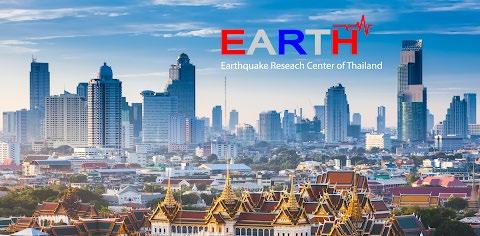
in more than 30 projects and numerous publications in academic journals. The knowledge gained from these projects has been widely disseminated to the public through mass media and to engineers and stakeholders through academic lectures and seminars. Seismic hazard maps have been updated and major changes to engineering regulations & standards for earthquakeresistant building design have been made by the impact of the research findings. Currently these active research activities are continued, with 11 earthquake-related research projects are being funded by the National Research Council of Thailand (NRCT).
With this background, it is reasonable to establish a national center for earthquake research in the country: the Thailand Earthquake Research Center (TERC). This center will promote greater collaboration among researchers and various key stakeholders in mitigating earthquake risk. According to the plan, TERC will not belong to any single institution; it will be a neutral national research center where researchers from various institutions in Thailand can contribute and work together on critical issues related to earthquake risk. A funding of 5,000,000 Baht per year will be provided by NRCT to support all activities of TERC. These activities are not researchbased, as NRCT has already provided separate funding to support ongoing research projects (more than 20,000,000 Baht per year). TERC’s activities will include organizing conferences and training workshops, conducting earthquake reconnaissance surveys, developing a onestop data and knowledge digital platform for researchers and the general public, and creating a system to share research facilities among various institutions.

AIT Research Theme: Infrastructure
AIT Unit: SET/StE
Project Duration: 30 April 2023 to 29 April 2024
Project Sponsor/Client: National Research Council of Thailand (NRCT)
Project Partner: Mahidol University, Chiang Mai University
Expected Social Impact:
1. Earthquake Catastrophe Model of Chiang Mai City and Chiang Rai City to assess the seismic losses and impacts caused by earthquakes in these areas.
2. Earthquake Impact Assessment Methodology for Thailand to be used in evaluating the potential impact of earthquakes in other areas of the country.
3. Earthquake Preparedness Plan and Risk Mitigation Programs based on the use of the model to minimize the potential impact of earthquakes on these areas.
4. Increased public awareness of earthquake risk by disseminating the results from the model and promoting the implementation of the Earthquake Preparedness Plan and Risk Mitigation Programs.
Description:
Earthquakes can cause severe damage to buildings and structures and result in significant economic and social losses. However, because earthquakes occur less frequently than other disasters, the general public and key stakeholders often lack experience and understanding of proper earthquake emergency response and risk mitigation. To address this issue, this research project aims
to develop an earthquake catastrophe model for Chiang Mai City and Chiang Rai City. The model will incorporate geospatial data on seismic hazard, geological conditions, exposures (buildings, structures, population, etc.), and their seismic vulnerability. It will compute various types of earthquake-induced losses and present them in GIS maps, enabling stakeholders and the public to visualize the impacts of possible future earthquakes without the need to wait for a real earthquake to happen.
Research:
1. Conduct a comprehensive survey of Chiang Mai and Chiang Rai cities to develop detailed maps of earthquake hazard zones, and create an inventory of buildings and infrastructure in these areas.
2. Analyze multiple earthquake scenarios and their potential impact on the two cities using sophisticated seismicity models to estimate potential losses and assess the risk level of each scenario.
3. Develop an effective emergency response plan based on the analysis of earthquake scenarios, and identify and recommend risk mitigation strategies to minimize losses.
4. Document the earthquake catastrophe model and distribute it to stakeholders and the general public for use in risk assessment, emergency planning, and disaster preparedness.
5. Develop and implement a public outreach and education program to increase awareness of earthquake risk and prepare the general public for disasters.

AIT Research Theme: Infrastructure
AIT Unit: SET/TrE
Project Duration: 31 December 2022 to 31 March 2024
Project Sponsor/Client: Toyota Daihatsu Engineering & Manufacturing
Expected Social Impact: To find the causes of car crashes by investigation the speed from Event Data Recorder (EDR).
Description:
The AIT research project, conducted under the “Infrastructure” theme by the School of Engineering and Technology (SET) and Transportation Engineering (TrE) unit, spans from 31 December 2022 to 31 March 2024. Sponsored by Toyota Daihatsu Engineering & Manufacturing, the project aims to investigate car crashes by analyzing speed data retrieved from Event
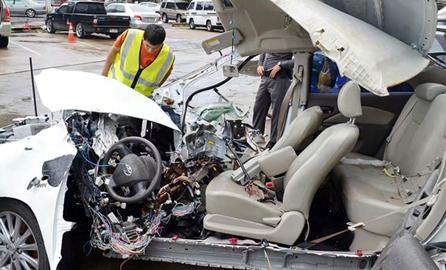
Data Recorders (EDRs). By focusing on specific crash patterns, the research seeks to uncover the underlying causes of these accidents. The data extracted from EDRs provides critical insights into vehicle dynamics and driver
behavior leading up to crashes, enabling a thorough analysis of contributing factors. The project’s findings are expected to have a substantial social impact by identifying key factors that contribute to car accidents,
ultimately leading to improved vehicle safety designs, better road safety measures, and more effective accident prevention strategies.





AIT Research Theme: Infrastructure
AIT Unit: SET/DPMM
Project Duration: 3 July 2023 to 31 December 2024
Project Sponsor/Client: Registration fees of the participants
Expected Social Impact: Encouraging research on the conference theme.
Description:
Organising International Symposium on Disaster Resilience and Sustainable Development at AIT Conference Centre. This is the third event of this series.
Disaster Preparedness Mitigation and Management (DPMM) AIT is pleased to invite you to participate in the upcoming event “The 3rd International Symposium on Disaster Resilience and Sustainable Development (DRSD 2023)“.
The “3rd International Symposium on Disaster Resilience and Sustainable Development” (DRSD 2023) organized by the Asian Institute of Technology brings together discussions on improving developmental practices to reduce long-term complex risks from disasters and
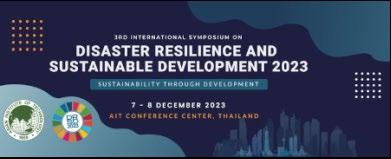
climate change and promote equitable sustainability. The Symposium invites academics, practitioners, students, public officials, NGOs, CSOs, private institutions, innovators, social motivators, and early career researchers globally to join an exciting discourse on disaster resilience and sustainable development. The Symposium will include keynote speeches, panel discussions, technical sessions, poster presentations, and academic exhibitions. DRSD 2023 is a continuation of DPMM-AITs previously successful DRSD symposia which were held in 2019 and 2021.
� https://ait.ac.th/event/3rd-internationalsymposium-on-disaster-resilience-and-sustainabledevelopment-drsd-2023/




AIT Research Theme: Climate change; Smart communities
AIT Unit: SERD/EEM
Project Duration: 7 July 2023 to 30 April 2024
Project Sponsor/Client: UN Environment Programme
Project Partner: UN Environment Programme
Expected Social Impact:
Better air quality management at the global , regional, and national levels.
Project Description:
This project is designed to amplify the collaborative efforts between AIT and the UN Environment Programme in air quality management on global, regional, and national scales. By engaging stakeholders from the private sector, financial institutions, and donors, the initiative seeks to implement more effective air quality
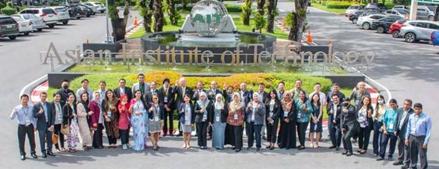
strategies across various levels of governance. The expected social impact is a significant improvement in air quality management, which is anticipated to contribute to healthier environments for communities worldwide. The initiative is spearheaded by AIT’s SERD/EEM unit and is supported by the UN Environment Programme, serving as both the project partner and sponsor. The project commenced on July 7, 2023, and is scheduled to conclude on April 30, 2024, aiming to create sustainable outcomes in environmental health and policy.

AIT Research Theme: Infrastructure
AIT Unit: SET/TrE
Project Duration: 16 November 2023 to 31 December 2024
Project Sponsor/Client: Department of Land Transport
Expected Social Impact:
To reduce fatality of MC accidents at nighttime.
Description:
The project is to conduct in-depth motorcycle accident investigation with high severity at nighttime and to identify the factors related to motorcycle accident at nighttime to develop proper countermeasures to reduce the number and severity of motorcycle accident at nighttime.
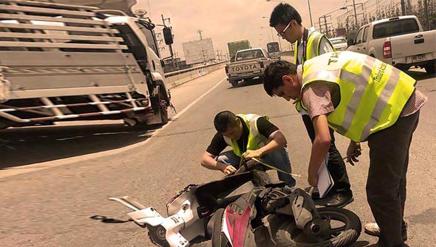



AIT Research Theme: Climate change; Technology, Policy and Society
AIT Unit: SERD/UIS
Project Duration: 15 December 2023 to 31 July 2024
Project Sponsors/Clients: Research and Innovation for Development (RIDA), the United Kingdom through University of Huddersfield
Project Partners: University of Huddersfield (the United Kingdom); The University of Sheffield (the United Kingdom); Doh Eain -Renewing Yangon - Private architect Farm (Myanmar); Asian Institute of Technology (Thailand)
Expected Social Impact:
The project’s objective is to explore resilient and sustainable urban transport strategies that mitigate transport-induced pollution’s repercussions. This will be achieved by integrating advanced sensor-driven models from Manchester and Bangkok with societal and policy insights from Yangon, addressing unique ASEAN sociopolitical and environmental challenges. Emphasizing community engagement, this approach focuses on comprehensive well-being and developmental progression to facilitate context-specific interventions across diverse urban landscapes.
The project aims to develop a comprehensive approach to mitigate transport-induced air pollution in urban areas, with a focus on Manchester, Bangkok, and Yangon. It seeks to leverage advanced technologies, stakeholder engagement,

and policy innovation to create sustainable and healthy urban environments.
Description:
The project aim is to explore resilient and sustainable low emission strategies for urban transportation and spatiotemporal models, with a strong emphasis on community impacts and localized adaptation options, aimed at mitigating air pollution and its adverse health effects. The project is grounded in empirical evidence linking transport emissions to deteriorated air quality and health adversities (Cohen et al., 2005). The focus on health as a priority area is supported by essential preliminary research and established links with Health and Environmental partners in the involved regions, reiterating the urgency of intervention. Global urban areas are witnessing an escalation in transport-induced air pollution, aggravated by climate anomalies, Urban Heat Islands (UHIs) and Urban Pollution
Islands (UPIs) effects (EPA, 2022) posing significant human health challenges with public health, social, economic, and environmental repercussions. The World Health Organization estimates around 7 million premature deaths annually due to air pollution (WHO, 2022), highlighting the

AIT Research Theme: Infrastructure
AIT Unit: SET/CE
Project Duration: 1 February 2024 to 31 July 2024
Project Sponsors/Clients: Mitsubishi Motor Thailand
Expected Social Impact:
Exchange knowledge on road safety.
Description:
This project is to organize the 1st Thailand Road Safety Forum. To reduce fatalities, injuries, and financial losses in Thailand, the Ministry of Transport launched a study on road accidents with support from the World Bank. This endeavor led to the formulation of the Thailand Road Safety Master Plan, identifying crucial challenges in implementing preventive, corrective, and mitigative measures. Collaborating entities such as the Department of Highways, Volvo Car Cooperation in Sweden, and
need/urgency for mitigation strategies. The project outlines a thorough examination/analysis of transport patterns and consequent air pollution emissions in Manchester, UK; Bangkok, Thailand; and Yangon, Myanmar, assessing a selection of diverse urban complexities.
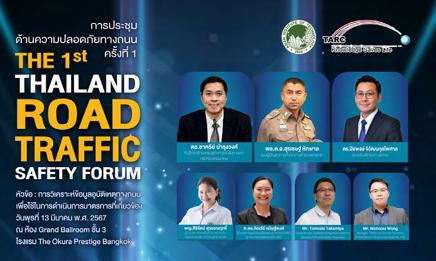
the Asian Institute of Technology (AIT) facilitated the establishment of TARC. The forum aimed to deepen understanding of the current and future road accident situations in Thailand, spotlighting data analysis, law enforcement, and road safety policies.





AIT Research Theme: Haze Monitoring and Forest Fire Detection
AIT Unit: Artificial Intelligence Technology Center
Project Duration: 26 May 2022 to 31 December 2024
Project Sponsor/ Client: Sithiporn Associates Company Limited
Expected Social Impact:
To improve the good health and well being of Bangkok and the metropolitan population from the effects of air pollution such as pneumonia or bronchitis. They also include discomfort such as irritation to the nose, throat, eyes, or skin. Air pollution can also cause headaches, dizziness, and nausea. Bad smells made by factories, garbage, or sewer systems are considered air pollution. To raise public awareness of the true pollution problem in cities and encourage people to make energy-saving changes in their lifestyle. Using public transportation instead of driving a car or riding a bike instead of driving a carbon-emitting vehicle are two ways to reduce air pollution. Others include not using aerosol cans, recycling yard trimmings rather than burning them, and not smoking cigarettes.

Description:
As stated in the Bangkok Development Plan 2022 to make Bangkok a pollution-free city , and to achieve the objective mentioned goals , The Office of the Environment is in full control of air quality management established air quality monitoring station in 50 different district in Bangkok province with various type of monitoring method to collect the data and creating the air pollution database dring 2019-2022. Aiming to create the model of air quirity to help measure and strategic planning to build the air quality in Bangkok .
The Pollution Control Department began a project to develop an air quality management information system with the goal of 1) linking the exchange of air quality data from various Bangkok air quality monitoring stations and 2) sharing the information between internal and external agencies by collecting data to analyze, process, and comparison the air quality measurement results, giving rise in more accurate processing of the air quality data center before publicizing the outcomes. And allow policymakers and air quality managers to rely
on cutting-edge science to establish regulations and make management decisions to reduce and control air pollution with cost-effective approaches. The information and status of air quality will be publicized to the population in various zones via mobile and web applications that will allow people to access real-time population information in order to avoid entering the hazard zone that is highly polluted and may affect their health.



Duration: September 2023
Description: A talk on ‘Sustainability in Practice’ was conducted by AIT Solutions. Mr. Jagdish Rele, Founder and CEO of Chaiam Consultants and a Former World Bank and UN delivered this talk to the Master students of Structural Engineering in AIT by sharing his experience in managing and implementing international corporate real estate projects and providing backbone support to mega development projects across geographies, even in fragile and conflict affected states.


Duration: June 2023
Description: In this webinar Mr. S M Zia Uddin, Coordinator of Wind Tunnel Testing and Structural Health Monitoring at AIT Solutions, delivered his insights on Performance-Based Seismic Structural Health Monitoring. The talk focused on the emerging promising solution of Structural Health Monitoring of buildings, that helps in rapidly assessing the damage after an earthquake, minimizing confusion, and ensuring informed decisions.
Weblink: � https://youtu.be/ agYmnYPPP2osi=jUaWDpG2E86oUULh
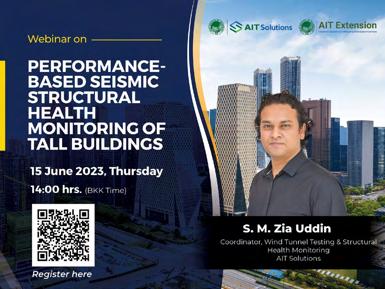



Duration: July 2023
Description: On 25th August, AIT Solutions organized a workshop on Building Resilient and Sustainable Infrastructure at AIT Sustainability Expo 2023. For this workshop, AIT Solutions invited Dr. Narong Leungbootnak, Chairman Future Engineering Consultants Co. Ltd., Thailand; Dr. Chaitanya Krishna, Assistant Professor, School of Engineering and Technology, AIT, and Dr. Saratchai Ongprasert, Executive Director (SP), TEAM Consulting Engineering and Management PCL, Thailand to share their insights respectively on Construction and Demolition Waste Management in Response to Sustainable Construction in Thailand; Structural Health Monitoring of Low-rise RC Building Updating; and Digital Twin for Smart Asset Management.
Weblink: � http://osc.ait.ac.th/day-3/
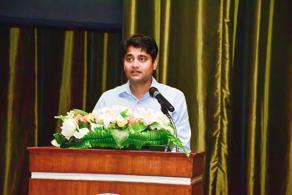
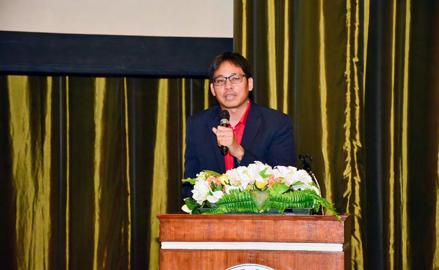
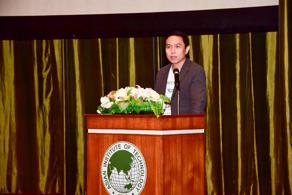
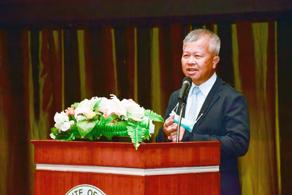



Duration: December 2023
Description: Association of Structural Engineering of the Philippines (ASEP) organized a Structural Engineering Expo on 30th Nov - 1st Dec. 2023. The event celebrated the practice of Filipino Structural Engineers.
Mr. Thaung Htut Aung, Director, AIT Solutions was invited by ASEP to be one of the speakers at the Expo. In his presentation on ‘Advancing Performance-based Seismic Design in the Philippines’, Mr. Aung provided a glimpse of the collaborative work that AIT Solutions has done with Filipino structural engineering consultants and also the various knowledge sharing and transfer activities that were conducted to advance the structural engineering profession in the Philippines.
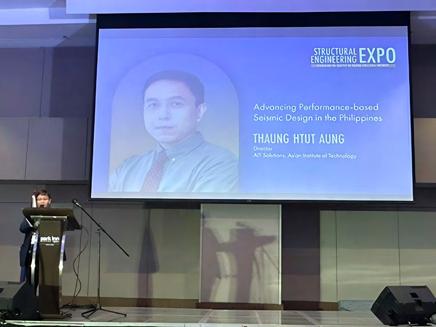

Duration: March to May 2023
Description: Menarco Development Corporation engaged the services of AIT Solutions, Asian Institute of Technology (AIT), Thailand, to carry out the wind tunnel test of Menarco Tower 2 located in Taguig City, Philippines. The project is a mixed-use 42-story tower comprising of residential and office floors with 5-underground basements. AIT Solutions worked closely with the various stakeholders (project engineers and developers) to enhance the reliability and costeffectiveness of the structural designs while ensuring occupant comfort, optimizing the façade design, and enhancing pedestrian comfort.
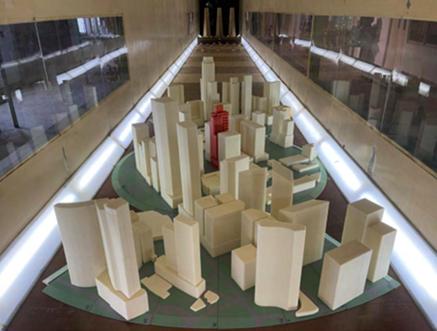
PUBLICATION OF “AIR QUALITY MANAGEMENT STATUS AND NEEDS OF COUNTRIES IN SOUTH ASIA AND SOUTHEAST ASIA, PUBLISHED ELECTRONICALLY, 22 SEPTEMBER 2023




Duration: 23 September 2023
Description: A peer review research article on “Air Quality Management Status and Needs of Countries in South Asia and Southeast Asia” was created by RRC.AP, Air Pollution Cluster and was published online by APN Science Bulletin on 22 September 2023.
In its content, a capacity building workshop on AQM was held in September 2022, representing 17 countries (8 from South Asia and 9 from Southeast Asia).
The workshop aimed to gather information on existing AQM facilities, challenges, and needs of participating countries. Based on the findings, most countries have limited monitoring stations, there were data gaps since a handful of countries have begun compiling data on emissions inventories, and there were air pollution policy challenges.
These findings reveal opportunities for improvement on the following:
⏵ Investment in AQM: Countries can prioritize strengthening various aspects of AQM, including increased investment in infrastructure and technical expertise.
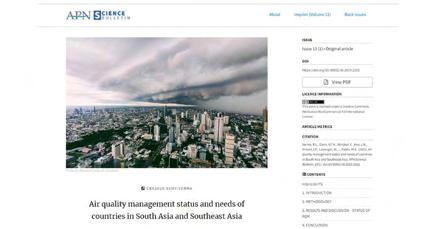
⏵ Financial Resources: International funding agencies can play a crucial role in mobilizing financial resources to support these efforts.
By addressing these challenges and taking advantage of available opportunities, the countries in South Asia and Southeast Asia can work towards cleaner air for their citizens.
Weblink:
� https://www.apn-gcr.org/bulletin/article/ air-quality-management-status-and-needs-ofcountries-in-south-asia-and-southeast-asia/




Duration: October 2023
Description: A peer review research article on “Air Quality Trends in Coastal Industrial Clusters of Tamil Nadu, India: A Comparison with Major Indian Cities” was created by RRC.AP, Air Pollution Cluster and was published online by Environmental Advances in October 2023.
In its synopsis, India developed several industrial clusters nationwide, including in the state of Tamil Nadu to boost manufacturing. This study documented air quality trends in industrial cluster cities of Tamil Nadu and compared them with those in Indian major cities. Between 2015-2020, data on key air quality parameters, such as particulate matter (PM10 and PM2.5), nitrogen dioxide (NO2), sulphur dioxide (SO2), and National Air Quality Index (NAQI) measured in these cities, were analyzed. Our results suggest that the air quality parameters in coastal industrial cluster cities did not exhibit much seasonal variability owing to the influence of coastal meteorology compared to the
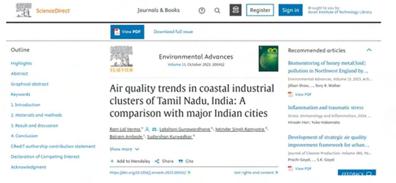
hinterland cities, such as Delhi. Among the cities, Delhi showed the highest PM10, PM2.5, NO2 concentration levels, and NAQI, while Mumbai had the highest SO2 concentration levels. We observed that over the years, the concentration levels of NO2 were showing a decreasing trend in all the cities and can be attributed to the air pollution reduction measures implemented in the cities.
Weblink:
� https://www.sciencedirect.com/science/article/ pii/S2666765723000704?via%3Dihub

Duration: 5 October 2020 to 30 December 2023
Description: To carry out this research project, the research team has been working on the research and development of an Automatic Suspect Tracking using Multi-camera System. The system includes a video processing module which will constantly process the video stream from the camera to detect and track a person. The tracking data is passed on to the identity extraction module which extracts clothing type and color information as well as extracting face information. The extracted identity information is recorded in the database system. This data is used to track the appearance of suspects in each camera view. The identity extraction module was implemented in the form of microservices to decouple the system and to enable scalable system deployment. The research team developed a deep learning model to segment
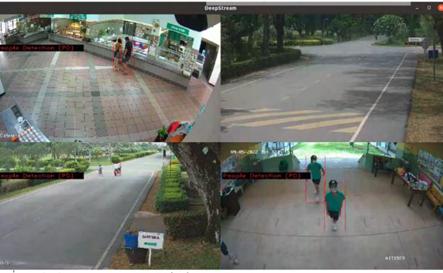
clothes region, clothing type and color. We use the Distilled Neural Network Training techniques to reduce the number of processing parameters to minimize the resource usage during inferencing.
INVENTORY AND AIR QUALITY MODELLING FOR EMISSION AND AIR QUALITY PREDICTION IN MAE MOH AND LAMPANG PROVINCE USING AN AUTOMATED NEAR REAL-TIME DATA COLLECTION ELECTRICITY GENERATING AUTHORITY OF THAILAND



Duration: 20 September 2021 to 30 July 2024
Description: This project “Emission Inventory and Air Quality Modelling for Emission and Air Quality Prediction in Mae Moh and Lampang Province Using an Automated Near Real-time Data Collection Electricity. Data was collected using focus group discussion with local leaders in the affected areas and from related documents and research. The Mae Moh electricity generating plant has prevented or mitigated the impacts, The Electricity Generating Authority of Thailand (EGAT) has developed a system for assessing particulate matter quantity and air quality. These measures will be successful if there is full participation of the stakeholders, community, local leaders, and local administrative organizations.
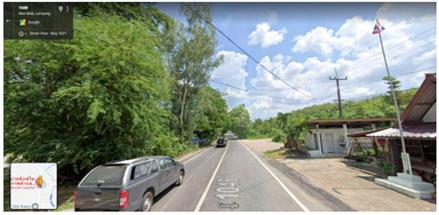





Description:
AIT RRC.AP hosted a webinar titled Making Cities Resilient 2030 (MCR2030): Capacity Building Models and Tools to Strengthen Cities’ Resilience in Asia and the Pacific on 23 February 2023. Over 160 online participants joined the live session.
Dr. Guilberto Borongan, Director of AIT RRC.AP, shared that the MCR2030 initiative provides a roadmap for cities to commit to building resilience to climate and disaster risks, and is comprised of three stages which includes, (i) improving cities’ understanding of risks and committing to reduce; (ii) strengthening cities’ capacity to develop local risk reduction strategies and plans; and (iii) supporting implementation. He stressed the importance of an integrated approach to building resilience to both climate change and disaster risks which can benefit from cities’ ability to leverage existing efforts. He emphasized some key factors which could be beneficial to achieving the MCR2030 goals, including, (i) vertical integration between national and local governments; (ii) private sector involvement; (iii) cities’ access to different resources and partners; (iv) access to finance; (v) strong policy support and political commitment; and
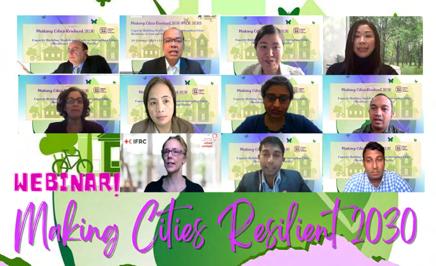
(vi) capacity-building, awareness raising and effective information sharing and advocacies. He highlighted that the ultimate goal of MCR2030 is for cities to be inclusive, safe, resilient and sustainable for all by 2030.
Weblink:
� http://www.rrcap.ait.ac.th/news/Pages/ vol24no1-03.aspx
Video link:
� https://www.youtube.com/ watch?v=JSXoCRLP07o



As the sun sets on the AIT campus, Sunny Tuladhar, a Data Science and Artificial Intelligence (DSAI) major, shares his musical talents by a serene lake with fellow students. Sunny’s deep-rooted passion for music, nurtured from a young age in a household rich with diverse musical influences, led him to combine his love for both music and technology.
Sunny’s journey began with the keyboard in grade 6 and flourished with the guitar in grade 8. Over 15 years, he developed his skills as a guitarist, eventually releasing his first album, *Traveler’s Tale*, in 2015, and his second, *Charades in the Sky*, in 2020. His dedication to music has earned him recognition in the Nepalese music scene, where he continues to thrive as a singer, songwriter, and producer.
At AIT, Sunny’s musical interests have fostered strong connections with a diverse group of campus musicians. He finds that music serves as a universal bridge, helping him connect with others and build lasting friendships. Through his involvement with the Student Union, Sunny has organized impactful music events and workshops, teaching students the basics of guitar and ukulele and inspiring a love for music within the campus community.
Sunny’s DSAI studies allow him to merge his artistic passion with technical innovation. His projects include developing a music-selling database, analyzing music streaming data, creating a song recommender system, and exploring how music affects concentration. He even used deep learning to identify guitar tones and developed a chord recognition script using Google’s MediaPipe.
Looking ahead, Sunny envisions a future where AI and music converge, yet he believes the human touch will always be essential. “AI can create music, but the human voice will always express something special,” Sunny
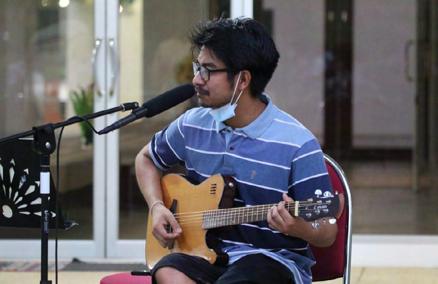
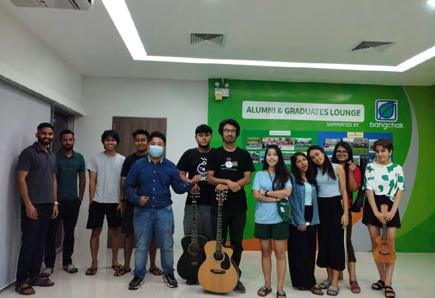
reflects. He remains committed to blending technology and music, hoping to continue creating and experiencing music in its most human form.
� https://ait.ac.th/2023/02/uniting-through-musica-dsai-majors-journey-of-connecting-with-hispassion-at-ait/


27 November 2023 – On 25 November 2023 during the 52nd AITAA Governing Board meeting, AIT President Prof. Kazuo Yamamoto and AITAA-Bangladesh Chapter Advisor Prof. Dr. Md. Kamal Uddin on behalf of Mr. Abdul Kashem Md. Shirin, President AITAA Bangladesh Chapter signed the donation agreement for the renovation of a Single Unit Student Dormitory.
With newly upgraded facilities, this renovation will help to improve our student’s learning environment and overall experience of living in AIT in a more comfortable living space. As a result, AIT students will be able to enjoy better accommodation during their time at AIT.
President Yamamoto expressed his heartfelt gratitude and appreciation to the AITAA Bangladesh Chapter for their kind assistance towards the Institute. This donation is greatly appreciated.
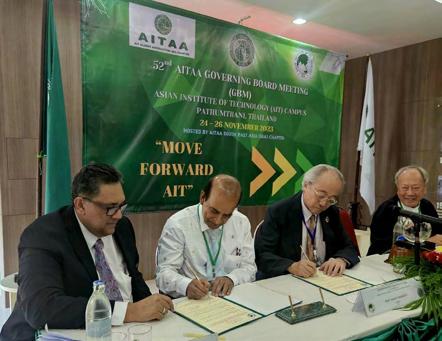


On December 7-8, 2023, the Asian Institute of Technology (AIT) hosted the 3rd International Symposium on Disaster Resilience and Sustainable Development (DRSD 2023) at its Conference Center in Pathumthani, Thailand. This biannual event, supported by numerous institutional partners, attracted over 220 participants from 25 countries, including experts, practitioners, policymakers, and students from various sectors such as academia, non-governmental organizations, government agencies, multilateral banks, and the private sector.
The symposium aimed to foster regional dialogue and showcase academic research on disaster resilience and sustainable development. The event was inaugurated by AIT President, Prof. Kazuo Yamamoto, and Dr. Indrajit Pal, Chair of the DRSD 2023 Organizing Committee. Prof. Yamamoto highlighted the crucial link between disaster resilience and sustainable development goals, emphasizing AIT’s ongoing efforts to promote these objectives. Dr. Pal, also Chair of the Disaster Preparedness, Mitigation, and Management (DPMM) Program, stressed the importance of collaboration for achieving sustainability and resilience.
Keynote addresses were delivered by Dr. Sanjay Srivastava from UN-ESCAP and Dr. Bhichit Rattakul from
the Thai Network for Disaster Resilience (TNDR). Over the two days, five international experts spoke on topics including delta resilience, urban flood management, international disaster collaboration, and infrastructure resilience to climate hazards.
The symposium featured four panel discussions on crucial topics: water supply and sanitation during emergencies, infrastructure resilience, disaster and climate resilience in coastal systems, and regional collaboration among Global South countries. Over 150 participants from more than 70 institutions presented their research through 126 oral and 24 poster presentations on themes such as climate change, remote sensing, governance, and ecological systems.
The event concluded with closing remarks from Dr. Roger Levermore, Dean of AIT’s School of Management, and Dr. Indrajit Pal, who emphasized the need for continued collaboration to build sustainable and disaster-resilient communities.
� https://ait.ac.th/2023/12/global-expertsconverge-at-drsd-2023-shaping-the-futureof-disaster-resilience-and-sustainabledevelopment-in-asia-pacific-and-beyond/
